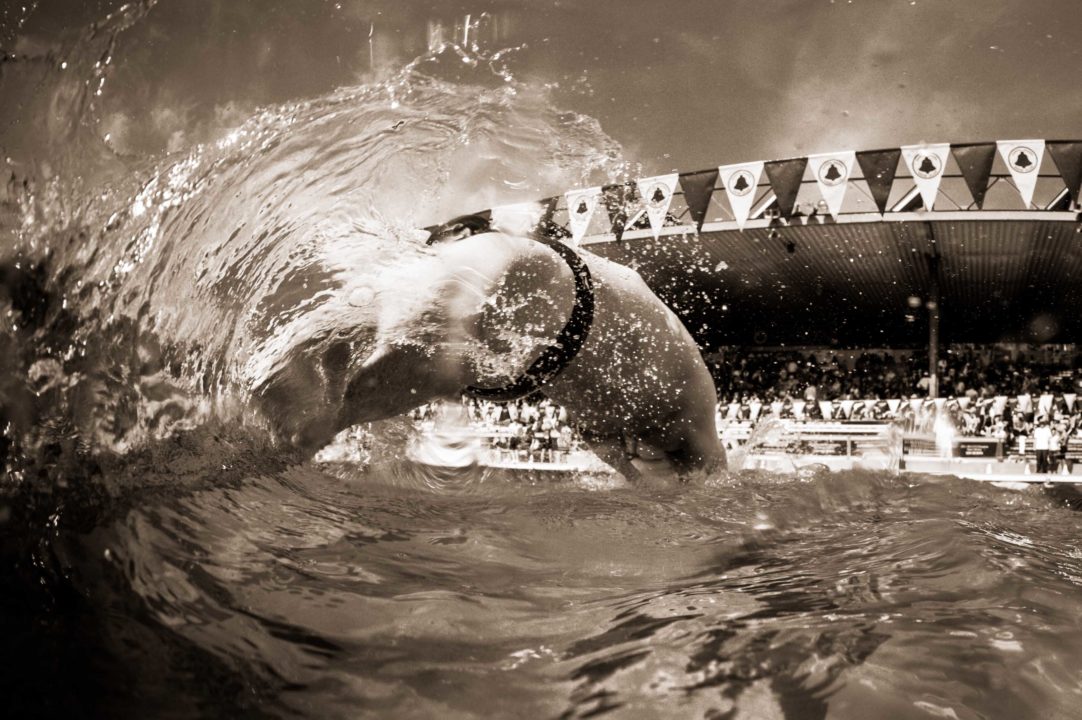When you train in the heat of summer, proper hydration is extremely beneficial to your training. Many athletes remember to drink fluids during practice, but may forget to hydrate outside of the pool. To make lasting changes in your hydration state, drinking water has to be an integral part of your entire day. Let’s discuss a few key ways to keep your fluids up and your performance at its maximum.
1. Drink Early and Often.
When you wake, your body is already dehydrated from several hours without drinking. Have a tall glass of water first thing in the morning—whether you have a practice that morning or not. Even when you don’t feel thirsty, drinking water is critical. By the time you feel thirst, your body is already dehydrated by 1-2% and you are behind on your fluids. This may not seem like very much, but researchers have found that mild dehydration (defined by 1.5% loss in normal volume of water) leads to fatigue, anxiety, difficulty in memory tasks, and tension. Stay ahead of your hydration by starting your day with water.
2. Hydrate During and After Practice.
Athletes are better at hydrating during practice—it feels more natural to keep your fluids up as you sweat in dryland or have a hard set in the pool. Swimmers should be aware that the volume of fluid they lose through sweat in the pool can be much higher than it seems. The body is tricked into feeling more hydrated than it is, simply because it is surrounded by water. Following practice, drink water with your recovery snack within 30 minutes. Water flushes out toxins and helps flush out excess acid from muscles in the body post-exertion. An easy way to maintain this habit is to refill the water bottle used in practice and continue to drink from it right afterward.
3. Avoid Salty Dinners
A large part of good hydration actually has to do with paying attention to the salt content of your food. As a general rule, restaurant food tends to be much higher in salt than any home-cooked meals. Your best option is to cook your own food and control how much salt goes into it. If you do not have the time for this, then opt for restaurant food that is light on sauces and dressings. Dishes with meat can be particularly high in salt.
Drinking water not only maximizes your performance but also helps you recover more quickly after racing and training. Staying hydrated may seem like a constant battle, but integrating the habit into your daily routine can make it easier to maintain. It helps you digest food properly, improves your mood, focuses your concentration, and contributes so much more to your well-being. Avoid flavored waters that have artificial sweeteners by squeezing a lemon into your water to make it more interesting. If you like sodas, try drinking sparkling water instead. It provides the same carbonation while giving you the hydration you need. Make a few of these minor changes to your hydration today, and see some major effects on your performance tomorrow!
References:
- http://www.huffingtonpost.co.uk/2012/02/20/mild-dehydration-causes-a_n_1288964.html
- http://www.cpt12.org/blog/index.php/2013/06/06/chronic-dehydration-are-we-thirstier-than-we-think/

 BridgeAthletic Logo 3BridgeAthletic works with elite professional, collegiate, and club swimming programs to provide a turnkey solution for dryland training. Led by Nick Folker, the top swimming strength and conditioning coach in the world, our team builds stroke-specific, custom-optimized dryland programs for each of our clients. The individualized workouts are delivered directly to athletes via our state of the art technology platform and mobile applications. Check Nick and BridgeAthletic out as recently featured in SwimSwam.
BridgeAthletic Logo 3BridgeAthletic works with elite professional, collegiate, and club swimming programs to provide a turnkey solution for dryland training. Led by Nick Folker, the top swimming strength and conditioning coach in the world, our team builds stroke-specific, custom-optimized dryland programs for each of our clients. The individualized workouts are delivered directly to athletes via our state of the art technology platform and mobile applications. Check Nick and BridgeAthletic out as recently featured in SwimSwam.
 Nick Folker is the Co-Founder and Director of Elite Performance at BridgeAthletic. Nick’s roster of athletes includes 35 Olympians winning 22 Olympic Medals, 7 team NCAA Championships and over 170 individual and relay NCAA championships. Megan Fischer-Colbrie works as the Sports Science Editor at BridgeAthletic. Megan was a four-year varsity swimmer at Stanford, where she recently graduated with a degree in Human Biology. The Championship Series by BridgeAthletic is designed to empower athletes with tips from the pros that will help them reach peak performance come race day. We will be covering competition-focused topics such as nutrition, recovery, stretching, and mental preparation.
Nick Folker is the Co-Founder and Director of Elite Performance at BridgeAthletic. Nick’s roster of athletes includes 35 Olympians winning 22 Olympic Medals, 7 team NCAA Championships and over 170 individual and relay NCAA championships. Megan Fischer-Colbrie works as the Sports Science Editor at BridgeAthletic. Megan was a four-year varsity swimmer at Stanford, where she recently graduated with a degree in Human Biology. The Championship Series by BridgeAthletic is designed to empower athletes with tips from the pros that will help them reach peak performance come race day. We will be covering competition-focused topics such as nutrition, recovery, stretching, and mental preparation.


I think the author made a mistake. Salt is critical to hydration. The body doesn’t absorb water unless the body has adequate salt.